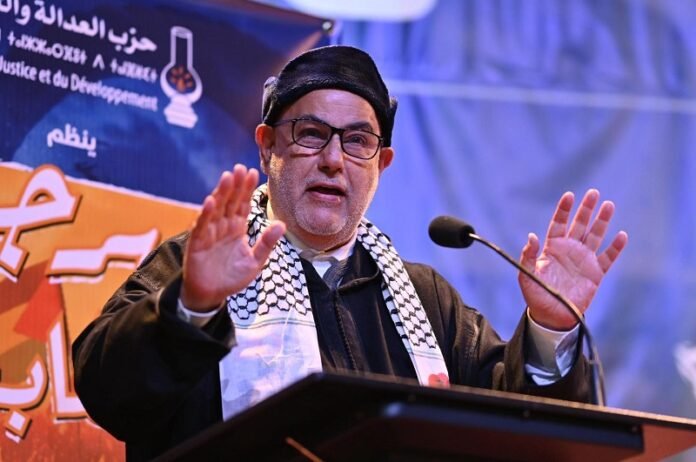In an unusual move, Abdelilah Benkirane, Secretary General of the Justice and Development Party and former President of the Moroccan government, addressed an open letter to French President Emmanuel Macron. In it, he criticized Macron’s recent statements justifying “Israel’s right to defend itself” in response to the attack carried out by Hamas on October 7, 2023.
Benkirane considered this statement to ignore the reality of the occupation and ongoing crimes against the Palestinian people, expressing profound dissatisfaction with the French position. This letter came at a time when Moroccan-French relations are experiencing tensions that have led observers to question whether this reflects a shift in Moroccan policy towards France.
What does Benkirane really want to say? And what does he not want to disclose?
In the letter, Benkirane expressed his displeasure with Macron’s speech before the Moroccan Parliament and his rejection of describing the attack carried out by Hamas as a “barbaric” act. Benkirane emphasized that Hamas, as a national liberation movement, is exercising its legitimate right to resist. However, this discontent was not limited to the Palestinian issue; Benkirane attempted to use diplomatic language to convey an implicit message to the French president.
While the letter criticizes French policy towards Palestine, it seems that Benkirane wanted to suggest that the stability of the exceptional partnership between Morocco and France depends on Paris’s positions on issues considered vital by Moroccans, with the Palestinian issue at the forefront.
Critique: Why now?
Benkirane presented his letter at a sensitive moment, which raises questions about his motivations. Does this criticism at this timing reflect a broader shift in Moroccan policy towards France? Or is it merely an attempt to respond to increasing domestic demands that call for strengthening Morocco’s independent positions, especially regarding Arab and Islamic issues? The timing of the letter, following several months of diplomatic tensions, opens the door for speculation about whether this initiative carries an implicit message to other European countries that remain neutral or indirectly support Israel.
French double standards: Contradictions requiring clarification
Benkirane’s letter addressed the issue of French duality in positions, denouncing Macron’s support for Israel and questioning how this position aligns with the values of France, which are based on principles of freedom and resistance. Benkirane pointed out that France, which resisted Nazi occupation and was a beacon for human rights, now stands with a state that practices genocide and forced displacement against the Palestinian people.
This contradiction raises a fundamental question: How can a country like France, which prides itself on its history of resistance, support a state that violates human rights in Palestine?
Palestine and the Sahara issue: Similarities in liberation struggles
Benkirane took advantage of the letter to reaffirm Morocco’s steadfast position on the Palestinian issue, noting that Moroccans see the Palestinian cause as equally important as that of the Moroccan Sahara. This parallel between the two issues could serve as a reminder to the French president that Morocco will not renounce its support for liberation causes, whether they concern its own territories or those of its Arab brothers.
Here, the question arises: Will Morocco continue on this dual path, supporting the causes of the Sahara and Palestine, amid increasing international pressures and double standards?
An open letter to the world or to domestic politics?
The internal dimension of the letter cannot be overlooked, as it also appears to be a message directed at the Moroccan public, which strongly sympathizes with the Palestinian issue. Perhaps Benkirane, as a national political leader, seeks to gain the support of Moroccan public opinion and strengthen his political position through this letter.
This raises the question: Was Benkirane addressing the external world only, or was he also seeking to bolster his political image domestically by defending a cause that enjoys widespread support among Moroccans?
Conclusion:
Regardless of the internal or external dimensions of this letter, it presents a significant challenge to France. The continuation of its current position on the Palestinian issue could affect its historical relationship with Morocco and jeopardize the future of their exceptional partnership.
Benkirane’s letter serves as a clear call for Paris to clarify its position and adopt a more balanced approach. Strategic alliances are not only based on economic and political interests but also on shared values and respect for people’s rights.


